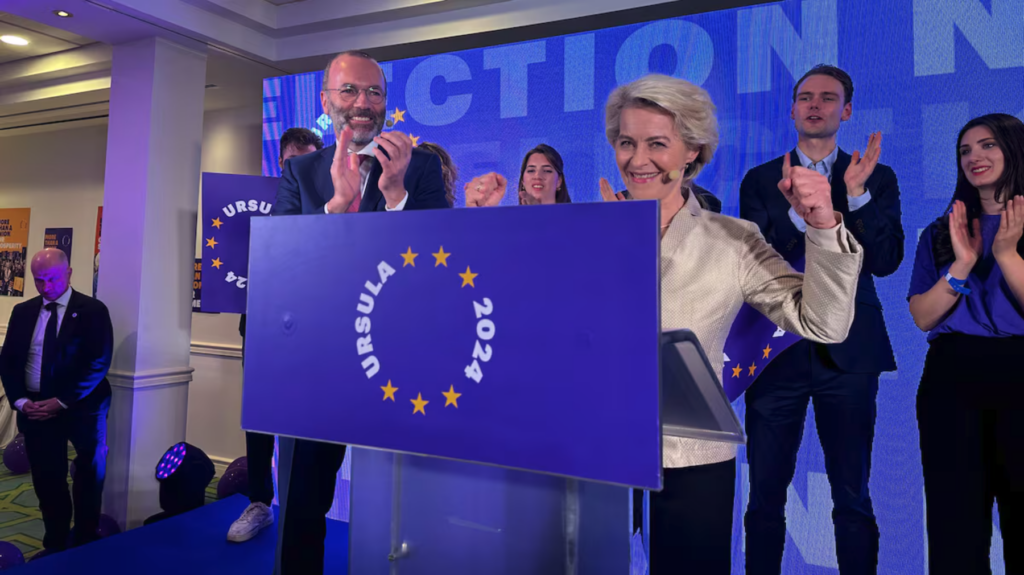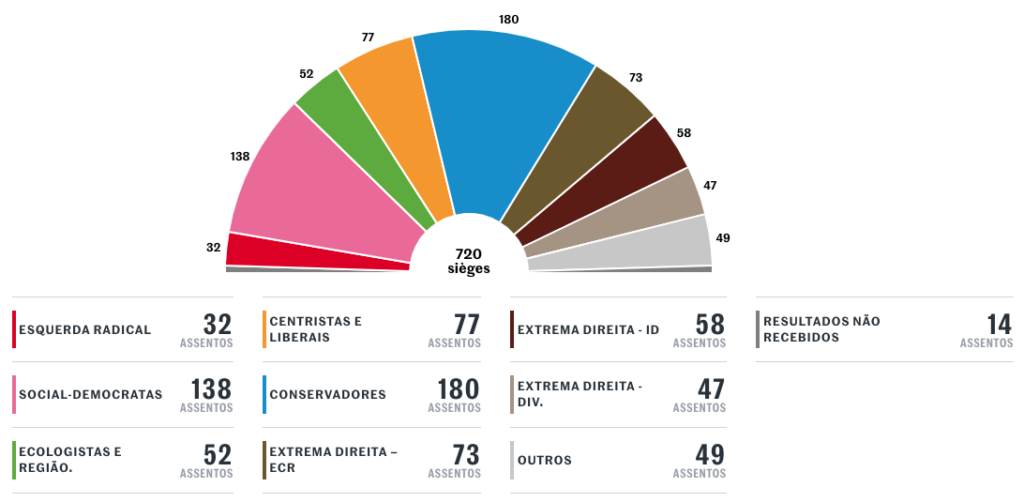
Published 06/10/2024 09:42 | Edited 06/10/2024 17:43
This Sunday’s European elections (9) marked a significant turn in the political scenario of the European Union (EU), with the rise of Eurosceptic (disbelievers in the EU) and even Europhobic (anti-EU) parties, which consolidated their presence and normalization in the European Parliament. Far-right and ultranationalist formations, which advocate the destruction of the current EU model, have gained a significant share of power, creating a high-risk legislature for the European project.
According to projections published by the European Parliament based on polls and partial scrutiny, ultranationalist forces, of a protectionist and conservative nature, won around 25% of the seats. This advance is especially notable in countries like France and Germany, where the impact on national governments and the Franco-German axis, the driving force of the EU, is profound. Still, the pro-European alliance managed to maintain its majority with 63% of the vote, according to the provisional count.
These elections are considered by many to be the most decisive in the history of the European Union (EU). The vote, which began on Thursday, June 6, called just over 360 million citizens to the polls to elect 720 MEPs. “This time, the EU is probably in the most decisive phase in its 70-year history. The number and severity of the crises, challenges and upheavals it faces simultaneously are unprecedented,” European affairs expert Malte Tim Zabel wrote in late April on the Bertelsmann Foundation website.
Political leaders from the 27 countries have spent the last few weeks repeatedly highlighting the importance of this election, trying to mobilize voters and combat predictions of abstention. But also calling for the fight against the advance of the extreme right in many countries. Many repeated the phrase: “Democracy is at stake”.
Read also: Reducing the powers of the European Parliament is a far-right issue in the elections
From Thursday (6), Europe elects deputies under threat of fascist advance
Performance of the main parties
The European People’s Party (EPP) emerged as the big winner of the elections, winning 185 seats, a slight improvement on the previous legislature. However, the sum of the ultranationalist forces reaches around 150 seats, surpassing the number of seats held by the Socialists and Democrats (S&D), who obtained 137 seats, a result with a decline. Furthermore, parties such as Fidesz, owned by Hungarian Viktor Orbán, which is now in the non-attached group, significantly increase the Eurosceptic presence in Parliament.
The traditional Europeanist coalition, made up of popular, social democrats and liberals (Renew), totals 56% of the seats in the new European Parliament. With the inclusion of the Greens, this number rises to 63%. The Greens, although they were the ones who lost the most strength, positioned themselves as a possible counterweight to the far right, indicating that they would be willing to support a pro-European coalition if the green pact were once again a priority.
The results of these elections impose a historic dilemma on the PPE. The party must now decide whether to continue its rapprochement with ultranationalists, such as the Brothers of Italy, the post-fascist party of council president Giorgia Meloni, or whether it will seek to maintain an alliance with social democrats, liberals and greens. “We will build a wall against the extremes of the left and the right, we will stop them,” Ursula von der Leyen of the EPP vaguely promised, while the president of the conservative group, Manfred Weber, invited the Social Democrats and liberals to form a pro alliance. -democratic and pro-European.
In northern Europe, however, the momentum of the far right, which had been growing since 2022, was interrupted. While elsewhere in Europe nationalist groups triumphed, they were defeated in the Nordic countries, left aside by the left, which emerged as the big winner in elections in Sweden, Finland and Denmark. A result welcomed by the head of the Swedish Left Party, Jonas Sjöstedt, who wants to see it as “a glimmer of hope” to Europe, while the leader of the Social Democrats, Magdalena Andersson, whose party won the elections, was delighted that “a left wind blows over Sweden” .
Still, parties such as the Belgian Vlaams Belang, the Dutch Freedom Party (PVV), as well as the extreme right from other corners of Europe, such as the Portuguese Chega, the Spanish Vox, the Alternative for Germany (AfD), the Polish Law and Justice (PiS) and Konfederacja, or the Hungarian formation Fidesz, are already preparing the bus to send their contingents of reactionary deputies to Strasbourg.

Impact on main countries
The European ultra-right massacred the government supporters in the main countries of the bloc. In France, Marine Le Pen’s National Regroupment won a landslide victory, doubling the vote for Renaissance, President Emmanuel Macron’s party, which called early legislative elections after the electoral fiasco. In Germany, the Alternative for Germany (AfD) achieved a surprising result, coming second, while Olaf Scholz’s Social Democrats faced their worst-ever result in European elections.
The growth of extremists and Eurosceptics in the European Parliament could significantly hamper the next legislature, especially on crucial issues such as green, economic, foreign and migration policies, as well as future EU enlargement. At a time of extreme volatility, with the war in Ukraine and Gaza, the economic withdrawal from the EU, the growing disinterest of the United States in its allies in the Old Continent, and the prospect of Donald Trump’s return to the US presidency, the China’s commercial and diplomatic offensive on the world stage, and global warming. “Europe is deadly”, warns Emmanuel Macron. “History is accelerating and we risk erasing France and Europe,” insists Jordan Bardella, from the opposition.
These elections put the credibility of the EU and the common European project at risk. The expansion of the far right, which already participates in or supports governments in several countries, highlights the growing political division within the bloc. The European Parliament now faces the task of finding a balance between divergent forces, while trying to maintain stability and advance a pro-European agenda amid unprecedented internal and external challenges.
These elections will not only decide the immediate future of EU governance, but also how it will address security, economic and climate challenges that are becoming increasingly pressing. The EU’s ability to reinvent itself and strengthen itself internally will be tested, and the results of this vote could very well determine the course of Europe in the coming decades.
Source: vermelho.org.br

